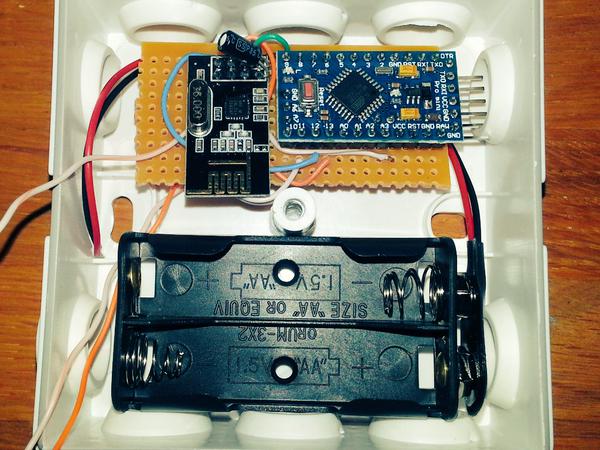Battery power sensor acting strange
-
So, I hooked up a Pro Mini with a DS18B20 and Battery Sensor resistors from the guide here. I have not yet cut off the LED or regulator and the complete sensor is running on 2xAA batteries.
Everything is working just fine, but today I noticed some strange behaviour where the battery percentage bounched to 87%, back to 83% and up to 89%... is this normal? What could be the reasons behind it?
This is how it looks like

Code I'm using
#include <MySensor.h> #include <SPI.h> #include <DallasTemperature.h> #include <OneWire.h> #define ONE_WIRE_BUS 3 // Pin where dallase sensor is connected #define MAX_ATTACHED_DS18B20 16 unsigned long SLEEP_TIME = 60000; // Sleep time between reads (in milliseconds) OneWire oneWire(ONE_WIRE_BUS); DallasTemperature sensors(&oneWire); int BATTERY_SENSE_PIN = A0; // select the input pin for the battery sense point MySensor gw; int oldBatteryPcnt = 0; float lastTemperature[MAX_ATTACHED_DS18B20]; int numSensors=0; boolean receivedConfig = false; boolean metric = true; // Initialize temperature message MyMessage msg(0,V_TEMP); MyMessage msgvolt(1,V_VAR1); void setup() { // Startup OneWire sensors.begin(); // use the 1.1 V internal reference analogReference(INTERNAL); // Startup and initialize MySensors library. Set callback for incoming messages. gw.begin(); // Send the sketch version information to the gateway and Controller //gw.sendSketchInfo("Temperature Sensor", "1.0"); // Fetch the number of attached temperature sensors numSensors = sensors.getDeviceCount(); // Present all sensors to controller for (int i=0; i<numSensors && i<MAX_ATTACHED_DS18B20; i++) { gw.present(i, S_TEMP); } } void loop() { // Process incoming messages (like config from server) gw.process(); // Fetch temperatures from Dallas sensors sensors.requestTemperatures(); // Read temperatures and send them to controller for (int i=0; i<numSensors && i<MAX_ATTACHED_DS18B20; i++) { // Fetch and round temperature to one decimal float temperature = static_cast<float>(static_cast<int>((gw.getConfig().isMetric?sensors.getTempCByIndex(i):sensors.getTempFByIndex(i)) * 10.)) / 10.; // Only send data if temperature has changed and no error if (lastTemperature[i] != temperature && temperature != -127.00) { // Send in the new temperature gw.send(msg.setSensor(i).set(temperature,1)); lastTemperature[i]=temperature; } } // get the battery Voltage int sensorValue = analogRead(BATTERY_SENSE_PIN); //Serial.println(sensorValue); // 1M, 470K divider across battery and using internal ADC ref of 1.1V // Sense point is bypassed with 0.1 uF cap to reduce noise at that point // ((1e6+470e3)/470e3)*1.1 = Vmax = 3.44 Volts // 3.44/1023 = Volts per bit = 0.003363075 float batteryV = sensorValue * 0.003363075; int batteryPcnt = sensorValue / 10; Serial.print("Battery Voltage: "); Serial.print(batteryV); Serial.println(" V"); Serial.print("Battery percent: "); Serial.print(batteryPcnt); Serial.println(" %"); if (oldBatteryPcnt != batteryPcnt) { // Power up radio after sleep //gw.sendBatteryLevel(batteryPcnt); gw.send(msgvolt.set(batteryPcnt)); oldBatteryPcnt = batteryPcnt; } gw.sleep(SLEEP_TIME); } -
I see in your code that before the battery level is sent the temperature is sent:
// Only send data if temperature has changed and no error if (lastTemperature[i] != temperature && temperature != -127.00) { // Send in the new temperature gw.send(msg.setSensor(i).set(temperature,1)); }Could it be that when measuring the battery voltage just after the temperature data has been sent the battery voltage is temporary lower?
A way to test that is to add a delay before sending the temperature.
-
Maybe this is your problem, which also described at the building page.
"The tap point could be bypassed with a 0.1 uF capacitor to keep the noise level low, at this otherwise high impedance point. "
